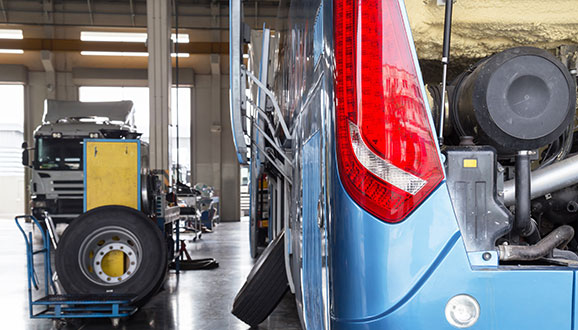
Safety & Maintenance Program
Keeping our vehicles in good working order pretty much sums up our maintenance philosophy. As graded by the Department of Defense, which has some of the most stringent inspection standards, Karst Stage currently has the highest quality vehicle maintenance programs around, receiving the highest score possible. Our staff takes pride in keeping vehicles in working order, minimizing the frequency of mechanical breakdowns.
Through the use of our daily vehicle inspections and rigorous preventative maintenance program, issues can be identified early and taken care of before they become problems. When a maintenance issue is identified, it is evaluated by the maintenance department immediately. A determination is made regarding the severity of the issue and appropriate action is taken. This action could be to fix the problem immediately, get non-critical issues scheduled for maintenance, or designate the bus as out of service until the issue is fixed.
KEEPING YOU SAFE
Our #1 focus is your safety. Our inspections ensure a terrific experience.

DRIVER INSPECTIONS
The maintenance process starts with the driver. Each driver is trained to do a complete vehicle inspection each time the unit is driven. This includes both a pre-trip and post-trip inspection. We believe the people who drive the vehicle can accurately identify vehicle problems.
If at any point the driver feels the vehicle is unsafe, he or she can put the vehicle out of service and have a mechanic look at it. This responsibility is one of the most powerful tools we give to our drivers to determine the safety of the vehicle. If the driver puts a vehicle out of service, that vehicle cannot be used until a mechanic completely inspects the vehicle and signs off that the issue has been corrected.

MECHANIC INSPECTIONS
The drivers do a great job of looking for and identifying issues. However, it is imperative that a mechanic also inspect our vehicles. Our maintenance program is designed to have a mechanic look at each vehicle every 45 days or 4000 miles, whichever comes first. Our fleet does over a million miles a year; as a result, the frequency in which vehicles are inspected by a certified mechanic is usually more often than is specified in our program requirements.
